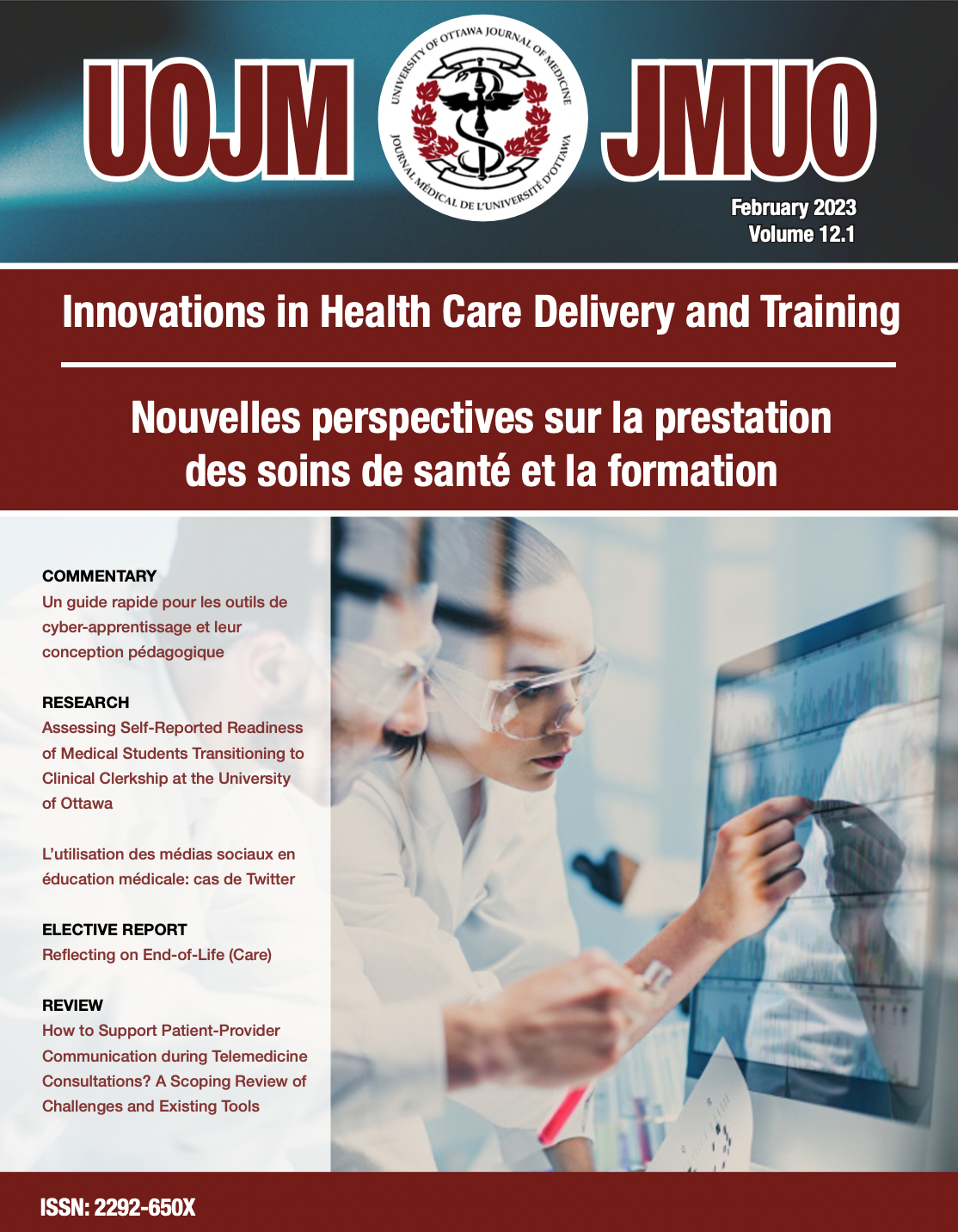Un guide rapide pour les outils de cyber-apprentissage et leur conception pédagogique
Main Article Content
Abstract
Le cyber-apprentissage, facilite l’accès en ligne à des ressources pédagogiques, partout et en tout temps. Il peut être utilisé à divers niveaux, comme dans le cadre de l’enseignement de nouveaux concepts, de la simulation, de l’évaluation et du travail collaboratif. Les outils de cyber-apprentissage sont aussi excellents pour susciter la participation des apprenants et favoriser l’apprentissage actif. Dans cet article, les auteurs discuteront des différents outils du cyber-apprentissage et des cinq étapes de la conception pédagogique en cyber-apprentissage, à savoir la définition, la conception, la création, la distribution et la démonstration, puis ils articuleront les meilleures méthodes d’évaluation de l’efficacité de ces outils.
Article Details

This work is licensed under a Creative Commons Attribution-NonCommercial-NoDerivatives 4.0 International License.
- Authors publishing in the UOJM retain copyright of their articles, including all the drafts and the final published version in the journal.
- While UOJM does not retain any rights to the articles submitted, by agreeing to publish in UOJM, authors are granting the journal right of first publication and distribution rights of their articles.
- Authors are free to submit their works to other publications, including journals, institutional repositories or books, with an acknowledgment of its initial publication in UOJM.
- Copies of UOJM are distributed both in print and online, and all materials will be publicly available online. The journal holds no legal responsibility as to how these materials will be used by the public.
- Please ensure that all authors, co-authors and investigators have read and agree to these terms.
- Works are licensed under a Creative Commons Attribution-NonCommercial-NoDerivatives 4.0 International License.
References
2- Redecker C. Review of learning 2.0 practices: Study on the impact of web 2.0 innovations on education and training in Europe. 2009 dec; No 23664 EN. Luxembourg: Office for Official Publications of the European Communities: JRC Scientific and Technical Reports - The Institute for Prospective Technological Studies.
3- Tavangarian, D, Leypold M, Nölting K, Röser M, Voigt D. Is e-learning the solution for individual learning? Electronic Journal of e-Learning, 2007 Jan;2 (2).
4- OECD. Inspired by technology, driven by pedagogy, Organisation for Economic Co-operation and Development. 2010.
5- _Bele JL, Rugelj J. (2010) Comparing Learning Results of Web Based and Traditional Learning Students. Dans: Luo X., Spaniol M., Wang L., Li Q., Nejdl W., Zhang W. (Eds.) Advances in Web-Based Learning – ICWL 2010. ICWL 2010. Lecture Notes in Computer Science, vol 6483. Springer.
6- Raynauld J. L’efficacité de l’apprentissage en ligne : Le cas d’un cours d’économie à HEC Montréal. 2005 https://web.hec.ca/congres2006/articles/Pelletier_M.pdf
7-Forget D. Les TIC au service de la formation à distance - entretien avec Josiane Basque – profetic. Le Journal De l’université De Québec à Montréal, 2012 Oct. 31(15), 3.
8- Masters K., Ellaway RH, Topps D, Archibald D, Hogue RJ. Mobile technologies in medical education: AMEE Guide No. 105. Med Teach. 2016 Jun;38(6):537-49.
9- MacLeod A, Fournier C. Residents’ use of mobile technologies: three challenges for graduate medical education. BMJ Simulation and Technology Enhanced Learning. 2017 Apr;3(3): 99-105.
10-Croskerry P. From mindless to mindful practice—cognitive bias and clinical decision making. N Engl J Med . 2013 Jun 27;368(26):2445-8. doi: 10.1056/NEJMp1303712.
11- Jenicek M. Medical error and harm: understanding, prevention and control. London: Productivity Press. 2011. 384p.
12- Moulton CA, Regehr G, Lingard L, Merritt C, Macrae H. (2010). Slowing down when you should’: initiators and influences of the transition from the routine to the effortful. Journal of Gastrointestinal Surgery. 2010 Jun;14(6):1019-26.
13- Ettelt S., Nolte E., McKee M., Haugen O., Karlberg I., Klazinga N., Ricciardi W., Teperi J. Evidence-based policy? The use of mobile phones in hospital. J Public Health (Oxf). 2006 Dec;28(4):299-303.
14- Garrison, D.R., Anderson, T., & Archer W. (2000). Critical Inquiry in a Text-Based Environment: Computer Conferencing in Higher Education. The Internet and Higher Education, 2(2), 87-105.
15- Archibald, D. (2011). Fostering cognitive presence in higher education through the authentic design, delivery, and evaluation of an online learning resource: A mixed methods study (Order No. NR98153). Available from ProQuest Dissertations & Theses Global. (1364629260). Retrieved from https://login.proxy.bib.uottawa.ca/login?url=https://www.proquest.com/dissertations-theses/fostering-cognitive-presence-higher-education/docview/1364629260/se-2?accountid=14701
16- Cook DA, Triola MM. What Is The Role Of E-Learning? Looking Past The Hype. Med Educ. 2014 Sep;48(9):930-7.

